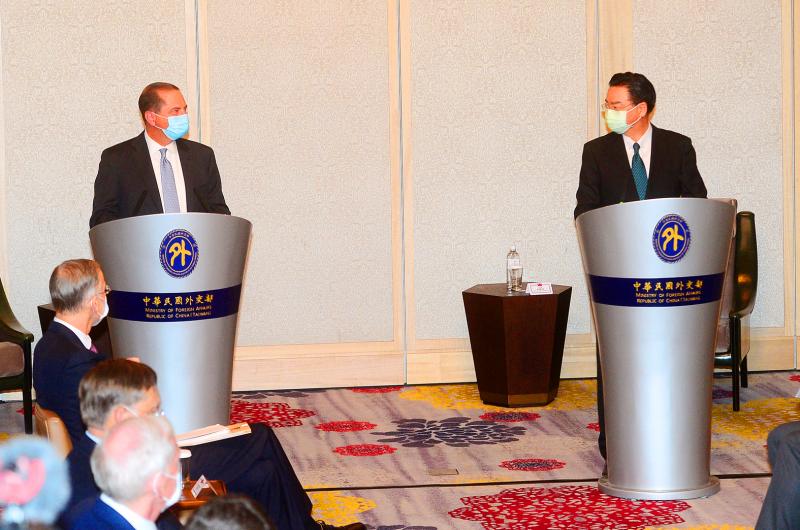International organizations are not the place to play politics, especially when the matter relates to healthcare, US Secretary of Health and Human Services Alex Azar said in Taipei yesterday, adding that the region and the world are safer because of Taiwan’s commitment to health promotion.
On the third day of his visit, the highest-level visit by a senior US Cabinet official in decades, Azar met with Minister of Foreign Affairs Joseph Wu (吳釗燮) at the Grand Mayfull Hotel in Zhongshan District (中山) yesterday morning, following his meetings with President Tsai Ing-wen (蔡英文) and Minister of Health and Welfare Chen Shih-chung (陳時中) on Monday.
Taiwan faces an increasingly difficult situation as China continues to pressure it into accepting its political conditions, “conditions that would turn Taiwan into the next Hong Kong,” Wu said before his closed-door meeting with Azar.
“The people of Taiwan are all too familiar with dealing with threats, be it military, diplomatic or the threats of epidemics,” Wu said.
Thanking Azar for supporting Taiwan’s fight for international space, Wu said that the battle is not just about Taiwan’s status, but about sustaining democracy in the face of authoritarian aggression.
“Taiwan must win these battles, so democracy prevails,” he said.
The US would continue advocating for the contributions Taiwan can make to the world on important issues like health, Azar said, adding that he would discuss these issues and Taiwan’s global health leadership with Wu.
Following his talk with Wu, Azar and his delegation attended a luncheon banquet hosted by Vice President William Lai (賴清德), representing Tsai.
Wu, Chen, former vice president Chen Chien-jen (陳建仁), National Security Council Secretary-General Wellington Koo (顧立雄), Minister of Economic Affairs Wang Mei-hua (王美花), Academia Sinica President James Liao (廖俊智) and American Institute in Taiwan Director Brent Christensen also attended the luncheon, Lai wrote on Facebook.
In the afternoon, Azar traveled to National Taiwan University’s College of Public Health, where he delivered a 15-minute speech to an audience of more than 100 health experts and students, as well as the ambassadors of Palau, the Marshall Islands, Nauru and Tuvalu — Taiwan’s four Pacific allies.
Azar praised Taiwan’s aid to Pacific island nations and others around the world, and praised former president Lee Teng-hui (李登輝), who died on July 30.
“President Lee’s legacy goes beyond just political freedom,” Azar said. “The democratic legacy he built has made Taiwan a leader not only in freedom and economic growth, but also in global health.”
“Taiwan’s approach to combating the virus through openness, transparency and cooperation stands in stark contrast to the country where the virus began,” he said.
“The Chinese Communist Party had the chance to warn the world and work with the world on battling the virus. But they chose not to, and the costs of that choice mount higher every day,” Azar said. “I believe it is no exaggeration to say that, if this virus had emerged in a place like Taiwan or the United States, it might have been snuffed out easily.”
“Instead, Beijing appears to have resisted information-sharing, muzzling doctors who spoke out and hobbling the world’s ability to respond,” he said.
China’s influence outweighs its investment in the WHO, and it uses influence not to advance public health objectives, but its own narrow political interests, he said.
Taiwan in 2016 became the eighth jurisdiction to publish results from its Joint External Evaluation by engaging the Johns Hopkins Center for Health Security as its evaluators, he said.
“The Indo-Pacific region and the whole world are safer because of Taiwan’s commitment to this public health work,” he added.
Azar is scheduled to pay his respects to Lee at a memorial to the former president at the Taipei Guest House today before his delegation heads to the airport to return to the US.
Additional reporting by AFP
Source: Taipei Times - 2020/08/12





















